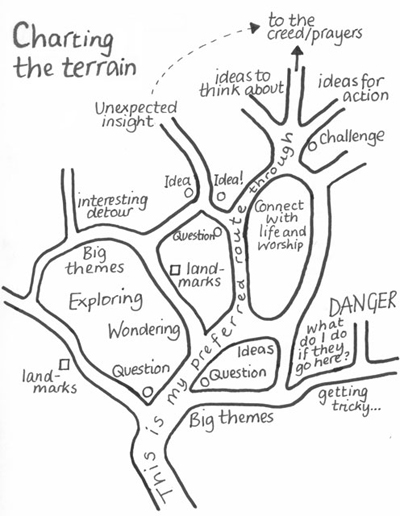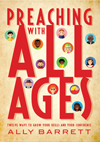Ally Barrett considers the importance of planning for effective improvisation.

One of the things that people fear most about exploring the Bible with all ages is that we know we should be interactive, but we’re afraid of losing control if people say unexpected things.
The more experience I’ve had, the more I’ve realised that it’s possible to lose this fear and gain confidence, treating all contributions as a potential gift from God.
One of the most important things I’ve learned is that exploring the Bible with all ages is going to involve improvisation, but that improvisation benefits from good planning!
Planning…
When we explore Scripture together we don’t do so in a vacuum – we do so in a context, and a big part of our preparation is understanding that context. It’s a bit like planning to lead an expedition; but rather than taking account of the terrain, climate, weather conditions, and the physical fitness of our group, we are looking at some of the following.
The Scripture
How does the Bible passage sit within Scripture as a whole? Will it help for your congregation to know something about the context in which it was written? If there’s more than one reading, how do they relate to each other? Using ROOTS Bible notes (or a Bible commentary) can give you some useful background.
For example, Paul did not write 1 Corinthians 13 for wedding couples, but a for a [church] community that was deeply divided; its message is as vital today as it ever was.
The worship
Usually we’re exploring Scripture during an act of worship in which everything has been planned to help the congregation encounter God. How will the rest of the service – the songs, hymns, prayers – or even the season affect how your congregation hear and think about the Bible passage?
The feeding of the 5000 feels so different in the context of a harvest festival at which children are admitted to Communion; from a new angle different meanings can be discovered.
The congregation
Knowing your congregation means you’re more likely to have some idea of how their own life experience, needs and gifts might affect how they hear the Bible passage, and what questions they might have. All-age congregations usually have a huge range of experiences and insights that you’ll be able to draw on, and it’s important to consider their diversity as we plan our exploration.
Not everyone is good with words; sometimes drawing can help children and adults share their thoughts and questions.
The Church’s mission
Your own church, or your denomination, probably has particular priorities. How might the Bible passage relate to these? The conversation between Scripture and the church’s strategic planning is something that all members of the body of Christ take part in, and gives people a sense of agency. Exploring Scripture together in worship is also a big part of how we are strengthened and inspired as disciples and apostles.
While there is much emphasis today on church growth, remember that Jesus measured the mustard tree by the quality of its hospitality. Good hospitality and welcome for all is something every church can do.
The world
What are the big issues that are in the forefront of people’s minds as they come to church? These might be local, national or global concerns, and while some of them might be shared by all generations, some may be specific to particular parts of your congregation. What sort of conversation does the Bible passage have with these issues? Will any resonances be particularly challenging?
In responding to climate change concerns, actively look for Scriptural resources to inspire care for creation; and remember, children and young people are often the most passionate and informed.
Theology
What does this passage tell us about God, and God’s relationship with us? How does it reflect some of the big themes of the Christian faith?
All those parables about the kingdom of God – they’re about heaven, but they’re also a reminder that God’s love for the world is something we can participate in as we go about our lives.
Yourself
Your own experience and perspectives matter. It’s always worth asking: ‘Why do I read this passage in this particular way? How is it making me feel, and why?’ A piece of Scripture may have special meaning for you – being aware of this helps you prepare for the possibility that others may see in it something quite different.
The complexities of our own family life may shape our response to the story of the prodigal son; but we should not let this prevent us from paying attention to other’s experiences too.
When I’m planning how to explore a Bible reading with a congregation, I find it helpful to draw a mind map to keep track of the things that occur to me. This means that by the time I’ve explored the reading in all these ways, I’ve have made a good start on ‘charting the terrain’. I’ve spotted some landmarks that I think might be interesting to people of different ages and picked out some connections between them, made a note of some pastoral or theological ‘hazards’, and identified a few different paths that we might end up following.

…to improvise!
You are the leader of an expedition, but your job isn’t to keep people on a single straight path from A to B, but to help them to join you on the journey of discovery that you’ve already begun. Because you’ve already charted the terrain in your planning, you’ll have some good ideas about where the conversation might go, and some of the danger areas. But members of the congregation may see fascinating landmarks that you didn’t spot. It takes courage to follow these diversions, but it’s when we do that we’re most aware of God at work in the conversation, speaking to us as we gather in worship.
Good planning – thoroughly understanding the terrain – means that when this happens we’re prepared to follow where it leads, even if it’s now where we thought we’d be heading. Without that planning, we might be too afraid to leave the path in case we can’t find our way back. In short, we plan in order to be able to improvise.
If the children subvert your plan to use a mobius strip to explore God as ‘three’ and ‘one’, by making it instead into a huge circle and dancing inside it – don’t stop them. They may have given you an even better example of what it means to be drawn into the life of the Trinity!
A matter of trust
We can trust God
All our planning needs to be done prayerfully, and we can keep intentionally listening out for God during the service itself. It’s God’s word we’re helping people explore, it’s God’s Spirit who guides our thinking and is moving through the congregation – including the children – in worship; and it’s God’s mission that we are taking part in. In Scripture we have so many witnesses to how God speaks through unexpected people, so it’s not surprising that…
We can also trust the congregation
Some of the most profound theology I’ve ever heard has been from children and others who aren’t always considered to be theologians. Empowering unheard voices is a significant part of facilitating conversation – especially a conversation that’s exploring Scripture together. We can’t always follow up an idea straight away, but any contribution is an offering that might lead somewhere amazing, and being open to this means that…
We’ll need to trust ourselves
We don’t need to have all the answers, but we do need to be willing to ask interesting questions and hear and enjoy ideas that we didn’t think of: questions that have more than one answer, questions that have no answer, and questions to which the best response is to wonder together.
Every time we explore Scripture together we learn something new about God, about our church community, and about ourselves. We broaden our perspectives, and gradually build up a resource bank of ideas and connections that we can draw on when we next find ourselves needing to improvise. Getting to know the terrain helps us dare to stray off the path, and it’s straying off the path that takes us to the new and exciting places where God is leading us – together.
When for the first time you have to give a talk at short notice, you will discover that, thanks to all your previous conversations, you have the ideas and skills to draw on, that you know people and what works for them – in short, it will be as if you had been preparing for it all your life.
In a future article, Ally will explore how to manage an all-age conversation; how to listen well in that context; how to make sure that all voices are heard; how you frame good open questions; and more.

Ally Barrett is chaplain at St Catherine’s College, Cambridge.
The subject of this article is explored in more depth in her new book:
Preaching With All Ages: 12 Ways to Grow Your Skills and your Confidence (Canterbury Press) which has just been published to tie in with the 2019 Festival of Preaching – at which Ally is a speaker (and ROOTS is an associate sponsor – if you are there, do come and meet us!).